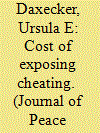|
|
|
Sort Order |
|
|
|
Items / Page
|
|
|
|
|
|
|
| Srl | Item |
| 1 |
ID:
112126


|
|
|
|
|
| Publication |
2012.
|
| Summary/Abstract |
This article examines the demand for criminal accountability for the atrocities committed after Kenya's contested December 2007 elections. It explains why, despite strong popular desire for accountability through prosecutions and the threat of and actual International Criminal Court (ICC) involvement, the government has failed to take concrete steps to try those believed primarily responsible. The article argues that the fundamental reason why the government has not initiated systematic prosecutions in regular domestic courts - or created, as promised, a hybrid national/international tribunal - is that those in charge of establishing these processes are, in many cases, those whom it would prosecute or their close allies. A hybrid tribunal now seems unlikely and credible national trials are an improbable alternative, though there are some reasons to be more optimistic following the new constitution of 2010. For the time being only international justice, which is beyond the government's reach, can achieve a breakthrough in criminal accountability, albeit in a very limited way.
|
|
|
|
|
|
|
|
|
|
|
|
|
|
|
|
| 2 |
ID:
117015


|
|
|
|
|
| Publication |
2012.
|
| Summary/Abstract |
This article investigates the relationship between international election observation, election fraud, and post-election violence. While international electoral missions could in principle mitigate the potential for violence by deterring election fraud, the ability of international observers to detect manipulation may in fact induce violent uprisings. Serious irregularities documented by international observers provide credible information on election quality, which draws attention to election outcomes and alleviates coordination problems faced by opposition parties and society. When elections are manipulated to deny citizens an opportunity for peaceful contestation and international observers publicize such manipulation, violent interactions between incumbents, opposition parties, and citizens can ensue. Consequently, the author expects that fraudulent elections monitored by international organizations will have an increased potential for subsequent violence. This expectation is evaluated empirically in an analysis of post-election conflict events for African elections in the 1997-2009 period. Using original data on electoral manipulation and reputable international election observation missions, findings show that the presence of election fraud and international observers increases the likelihood of post-election violence. Matching methods are employed to account for the possibility that international observers' decisions to monitor elections are endogenous to the occurrence of violence in the electoral process. Results for matched samples confirm the findings in the unmatched sample. A variety of robustness tests show that the results are not influenced by the operationalization of independent variables and influential observations.
|
|
|
|
|
|
|
|
|
|
|
|
|
|
|
|
| 3 |
ID:
109924


|
|
|
|
|
| Publication |
2011.
|
| Summary/Abstract |
This paper examines how the Kenyan police responded to the 2007/08 crisis of post-election violence. It provides a critical re-evaluation of the well-known argument of the police being political instruments of the regime of the day. In addition, it develops the argument that the view of the police as mere tools of the political leadership is too limited an explanation of police conduct in responding to ethnic and election violence. It suggests that even with the limited available knowledge of the operations of African police organisations there is room to introduce more variables and complexity in explanations of their conduct.
|
|
|
|
|
|
|
|
|
|
|
|
|
|
|
|
| 4 |
ID:
164036


|
|
|
|
|
| Summary/Abstract |
Despite the attention to gender and conflict in empirical positivist peace research, and the interest in local agency in recent peacebuilding literature, women’s understandings and lived experiences of peacebuilding are not necessarily well accounted for. This article, drawing on interviews, focus groups and observation research with 57 female victims/survivors of post-election violence in Kenya, provides an ethnographic study of women’s largely informal peacebuilding activities, ranging from mediation and dialogue to economic empowerment. It analyses women’s constructions and ways of making sense of being peacebuilders, demonstrating that, while participants employed dominant gender frames, they exerted considerable transformative agency in their communities. It argues that their ‘gendered responsibility for peace’ at community level is simultaneously empowering and disempowering. The research aims to increase understanding of the gendered nature of peacebuilding and the ways in which women exercise peacebuilding agency through a focus on their own voices and lived experiences.
|
|
|
|
|
|
|
|
|
|
|
|
|
|
|
|
|
|
|
|
|